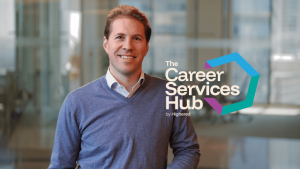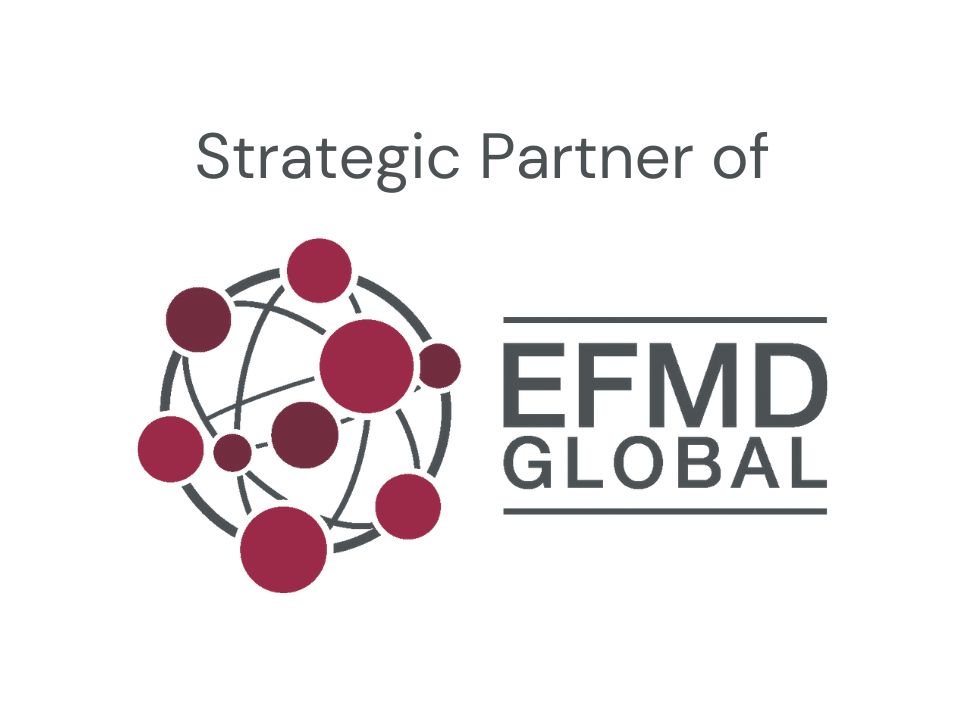Reflections on the state of the industry in a post-COVID marketplace
The Career Professionals Development Institute (CPDI) was inaugurated in November 2019, following years of feedback from Career Services professionals from the EFMD Global network, as to the need to go deeper into the challenges of the industry. Since then, this program, which is jointly organized by Highered and EFMD, has endeavored to equip talent professionals with the expertise, tools and resources required to meet the needs of the talent who are on a quest to fulfill career ambitions, often with expectations that may not always align with the realities of global labor markets, especially considering the competitive and fast evolving post-COVID marketplace.
The 3rd edition of the CPDI recently concluded on May 21st, 2021, after a week-long of sessions with leading facilitators whose modules covered Career Advising, Career Education, the HR Tech Behind Talent Analytics, Recruiter Expectations and Co-creating Value with Recruiters and High-trust Leadership. As CPDI Program Director from the outset, I want to shed light on the issues uncovered directly by the participants themselves, Career Services Directors and professionals from top global academic institutions, including:
- The Manchester Metropolitan University
- University of Porto
- Burgundy School of Business – BSB
- ETH Zürich
- Aalto University School of Business
- HEC Liège- Management School
- Audencia
- Nova School of Business and Economics (Nova SBE)
- WHU – Otto Beisheim School of Management
- Reutlingen University
- Lund University School of Economics and Management
- University of Economics in Katowice
- Carleton University
- University of Antwerp
- Trinity Business School
Introduction
During this most recent edition of the CPDI, we gave the digital stage to our cohort during a Peer Roundtable, during which each school had 2 minutes to pitch a critical challenge they are facing at their institution, followed by 2 minutes of rapidfire suggestions for solutions from fellow participants. What you are about to read is a selection of six issues weighing on their minds, often affecting the well-being of talent and staff alike.
Our Career Services professionals represent the world’s leading business schools with ambitious plans and increasing numbers of graduates each year. At the same time, they experience hiring constraints and struggle to provide relevant career support for a diverse and demanding student population who expect extreme professionalism with regards to career planning. With nearly 700 business schools in 92 countries, some EFMD Career Services professionals face difficulty in placing more students abroad, while others encounter the exact opposite, increasing numbers of international students lacking local language skills and/or work permit authorization. All of this in a post-COVID context in which remote work is here to stay as a result of the pandemic, making it easier for companies to consider students from schools that were not on their original target list. In other words, competition is fierce.
Challenge 1. Students from abroad who do not speak the local language
The specific case of our participant, representing a business school in Finland, are the international students who do not speak Finnish, and find it very difficult to secure a job in Finland given that companies express that they only want to meet the Finnish speaking students.
This is a classic challenge for Career Centers around the world, from institutions that attract international students who choose an institution, with hopes of staying following graduation to work in the country in question. Their lack of knowledge of the local language often makes it very difficult for them to find a job, given that employers frequently have less opportunities for those who do not meet the language requirements. In certain countries, the employers express that they only want to meet students with proficiency in the local language, the result being that the foreign students, who tend to be very active with Career Service activities and events, become increasingly more desperate.
Proposed solutions include creating a country guide to working in the country in question, targeting international students, with messages from the Dean, Directors of Corporate Relations, Careers and Alumni, advice from intercultural experts and international insiders, as well as myths & realities, tools for the job search, how to customize an application to the local market and interviewing. The guide should also feature the alumni network as a key resource, covering the inspiring success stories of international alumni who are working in-country. Finally, include useful websites, a glossary of key terms in the local language related to the job search, resources and an alternative reading list.
Another recommendation was to organize fairs, workshops and events specifically targeting international students. Such events will help to alleviate the frustration experienced by students when they find that employers conduct their presentations in the local language, in order to dissuade international students from attending and applying.
Challenge 2. Lack of work permit authorization for the target country
While language is one issue, work permit authorization is no less of a challenge. One participant, whose school is based in Switzerland, identified 3rd country nationals, non-EU and non-EFTA, as their challenge. Once again, talent choose to study in Switzerland with the intention of staying to work there after. However, the work permit they need is one initiated by the employer, while work permits are limited and each state has a quota.
To alleviate this situation, fellow participants recommended offering services to support them to return to their home country. Meanwhile, another school in Portugal mentioned the reverse for alumni abroad looking to return – having information available regarding their corporate partners. Another proposed solution included cooperating with other universities in the region facing the same issue, and lobbying together to have a dialogue with the government.
Both the language and work permit challenges would benefit from a proper management of expectations prior to enrolling in the institution.
Challenge 3. Need for interactive career support in an online environment with minimal resources
Here we have the challenge of a very small Career Services team, serving a large volume of students. While everything was moved online during the pandemic, the students wanted the support to be interactive.
A CPDI participant who is also an academic, suggested involving the students’ academic tutors to take a bit of the burden off of Career Services. Another participant suggested the use of technology such as CV360 by Abintegro, for CV optimization.
Challenge 4. Show-up rate to Careers events is low
While one participant cited a very committed network of corporate partners that are keen to run activities on campus, with a very limited Career Services team they are faced with a lack of student commitment and seek suggestions to minimize the no-shows.
One participant was quick to state that “time the event too much ahead and they won’t show up”. The trick is to open events up for registration closer to the event. Another school requires students who cancel with less than 48 hours notice, to find a classmate to attend in their place, in an effort to maintain the show-up rate. There was also the standard sending of personal reminder emails to all who have registered, as well as a recommendation for a passport type system, rewarding those who do attend with community engagement points or similar. The more points for participation and attendance, the more benefits they will receive in exchange from Careers. And while for many schools there has long been a mentality of focusing on those students who do care and attend, another school makes it a practice to email the no-show students in order to get them to think twice prior to registering in the future.
Challenge 5. Obtaining a response to graduate outcomes surveys
An academic member of staff who is an employability lead for a large faculty posed the question of how do we ensure that students know about the employability survey that will be sent after 15 months? How do we tell them in advance to expect this and to complete the survey?
Achieving a critical mass of responses to graduate outcome surveys is no new challenge in the world of Careers, especially for rankings-oriented institutions. While it requires a lot of work and time, fellow participants were quick to suggest personalized outreach to each individual, as well as an incentive for completion. Another school focuses on marketing the results of the previous survey heavily to the current students, so they are already familiar with it during their program, literally mentioning this from the day of the opening ceremony.
Another school created a career development program for recent alumni and use it as a channel to communicate the importance of responding to the survey during that program. Along these lines, a fellow participant chimed in as to how they partner with faculty who teach the graduating students and embed it into the class.
And because placement can be such a challenge, there is even one program where students can get credits for a placement opportunity.
Challenge 6. Career Center financing
One CPDI participant openly asked others for advice on how to convince the university authorities to develop the career center? This challenge shed light on the different models prevalent at EFMD schools, from self-funded career centers in which students pay a fee, to centers that charge companies for access to talent and employer branding opportunities, to others who focus on explaining the importance of soft skills and career development to Deans and Senior Management of the institution. It is important to learn to speak the language of financial affairs, and make the connection between Career Services, graduate outcomes and the bottom line of the school. Others choose the route of showing the Management Board how Careers supports the school’s brand by avoiding student failure in interviews or a poor CV that can harm the school’s reputation. Finally, showing the importance of Careers-related criteria in the rankings, and how investing in Careers will correlate with positioning.
While the initial wave of recommendations was on how Career Services can persuade their school to invest more in such a relevant and strategic department, two other participants’ strategies involved empowering students to go to the Dean to request improvements to Career Services, as well as establishing an Employer Advisory Board who can advocate for Careers.
Conclusion
There you have it. While there are no work issues that should keep one up at night, the aforementioned can prove overwhelming to EFMD Career Services professionals.
With a 4th edition of the CPDI on the horizon for May 2022, we strive to continue to advocate, support and empower Career Services to lead effectively and guide the pathways of the talent, while building a loyal recruiter network. Let us not forget that talent is at the core of so many of our missions, and the importance of staying focused to avail more opportunities for them.
At the same time, the energetic participation on behalf of the CPDI participants has been impressive, and is only the beginning of collaboration, partnerships and ongoing dialogues on various career issues among EFMD institutions in benefit of the talent.
About the author: Amber Wigmore Alvarez, PhD, is Chief Talent Officer of Highered.
Are you representing a School?
There are plenty of ways we can help your Career Services. Just get in touch with us and find out about all of our products and services.
Are you an Employer?
Talk with our Corporate relations team about how we can help your company grow.
Are you a Student?
You can now join our team! Get your experience in marketing and communications and apply to our Student Ambassadors Program.







